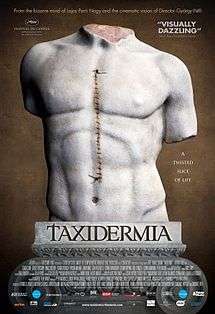Taxidermia
| Taxidermia | |
|---|---|
|
Theatrical release poster | |
| Directed by | György Pálfi |
| Produced by |
Péter Miskolczi Gábor Váradi |
| Written by |
György Pálfi Zsófia Ruttkay Lajos Parti Nagy |
| Starring |
Csaba Czene Gergely Trócsányi Piroska Molnár Adél Stanczel |
| Music by | Amon Tobin |
| Cinematography | Gergely Pohárnok |
| Edited by | Réka Lemhényi |
Production company |
Amour Fou Filmproduktion Eurofilm Stúdió Katapult Film La Cinéfacture Memento Films Production |
| Distributed by |
Pool Filmverlieh (Austria) Memento Films (France) Regent Releasing (US) |
Release dates |
|
Running time | 94 minutes[1] |
| Country |
Hungary Austria France |
| Language |
Hungarian English Russian |
| Budget |
HUF 500 million[2] US$2.2 million |
| Box office | $11,408 (USA)[3] |
Taxidermia is a 2006 Hungarian/Austrian comedy-drama horror film directed by György Pálfi. The film is a metaphorical socio-political retelling of Hungary's history from the Second World War to the present day.[4]
The story is told by means of three generations of men from Hungary, beginning with a military orderly during the Second World War, moving on to an aspiring speed-eater during the Cold War, and concluding with a taxidermist during modern times. The film has elements of dark comedy and body horror.
Plot
The film begins in a remote Hungarian military outpost, where orderly Morosgoványi Vendel lives a wretched existence of servitude beneath the heel of his lieutenant, Öreg Balatony Kálmán. Condemned to performing menial duties for the officer and his family while sleeping in an unheated shack next to the latrines, Morosgoványi frequently escapes into fantasy. So realistic are these fantasies that in one ambiguous instance, Morosgoványi sleeps with and impregnates the lieutenant's wife and "wakes up" to find himself engaged in an act of sodomy with a slaughtered pig. Upon seeing this, the lieutenant promptly executes Morosgoványi and raises the son, Balatony Kálmán, as his own.
Decades later Kálmán has grown into a champion Hungarian speed eater. Coached and influenced by the strict Jenő, Kálmán's life revolves around training for the eventual day when the IOC recognizes speed-eating as a legitimate sport. After a bout of lockjaw at a Soviet event and eloping with fellow speed-eating champion Aczél Gizi, Kálmán resumes his rigorous training, even as Gizi gives birth to their son, Balatony Lajoska.
Decades later, Lajoska has grown into a dedicated, professional taxidermist. In contrast to both his parents' girth, Lajoska appears pale and impoverished, with a thin anemic frame and haunted visage. When not working from his taxidermy shop or failing in his attempts to lead a normal life, Lajoska purchases groceries for his father Kálmán, who has grown so monstrously obese that he cannot leave the chair in his claustrophobic apartment. Kálmán, who feeds butter to his caged cats, has nothing but harsh words for his son who, upon reaching his breaking point, abandons his father to his own prison. Returning later, he discovers that the cats have escaped their cages and, desiring meat, have eviscerated his father.
Lajoska stuffs his father and the cats. With little left to live for, he locks himself in a homemade surgical harness and through the use of sedatives and painkillers, begins removing his own internal organs. Pumping his body full of preservatives and sewing himself up, he activates the machine that decapitates him, leaving behind a preserved statue. His body is displayed in an exhibit along with the cats and his father.
Cast
- Csaba Czene as Morosgoványi Vendel
- Gergely Trócsányi as Balatony Kálmán
- Piroska Molnár as Hadnagyné
- Adél Stanczel as Aczél Gizi
- Marc Bischoff as Balatony Lajoska
- István Gyuricza as Hadnagy
- Gábor Máté as Öreg Balatony Kálmán
- Zoltán Koppány as Miszlényi Béla
- Erwin Leder as Krisztián
- Éva Kuli as Leóna
- Lajos Parti Nagy as Dédnagypapa
- Attila Lőrinczy as Pap
- Mihály Pálfi as Baba
Production
The film is based on short stories by Lajos Parti Nagy.
The film is a Hungary / Austria / France co-production and the language is Hungarian.
Soundtrack
The film features music scored by electronic artist Amon Tobin. Also contains music written by the band Hollywoodoo during the end credits. The song is entitled "Erdő" (translated as "Forest") and is from the album "Karmolok, harapok" released in 2004, which directly translated from Hungarian to English means "I Scratch, I Bite". The video to the song is directed by György Pálfi and contains many scenes from the film including copies of scenes containing various band members.
Release
Taxidermia was screened in the Un Certain Regard section at the 2006 Cannes Film Festival.[5]
The film received a limited release in the US on 14 August 2009 (three years following release in its home countries) and has grossed $11,408 in the USA.[3]
See also
References
- ↑ "TAXIDERMIA (18)". British Board of Film Classification. 2007-06-19. Retrieved 2012-11-13.
- ↑ "Taxidermia (2006) - Box office / business". Internet Movie Database. Amazon.com. 2010-01-01. Retrieved 2012-11-13.
- 1 2 http://www.boxofficemojo.com/movies/?id=taxidermia.htm
- ↑ "www.imdb.com". forum discussion. Retrieved 2012-01-07.
- ↑ "Festival de Cannes: Taxidermia". festival-cannes.com. Retrieved 2009-12-16.
External links
- Official website (US)
- Official website (Hungary)
- Taxidermia at the Internet Movie Database
- Taxidermia at AllMovie
- Taxidermia at Box Office Mojo
- Taxidermia at Rotten Tomatoes
- Taxidermia at Metacritic
- Matthew Sorrento's review of Taxidermia (Film Threat – Philadelphia Film Festival '07)
- european-films.net's review of Taxidermia
- Mariya Ivancheva. "Allegories of Transition: Representations of Past and Present Repressive Regimes in Gyorgyi Palfi’s Feature Film Taxidermia and the House of Terror Museum in Budapest", in: Philosophia: E-Journal of Philosophy and Culture, 4/2013. ISSN 1314-5606
